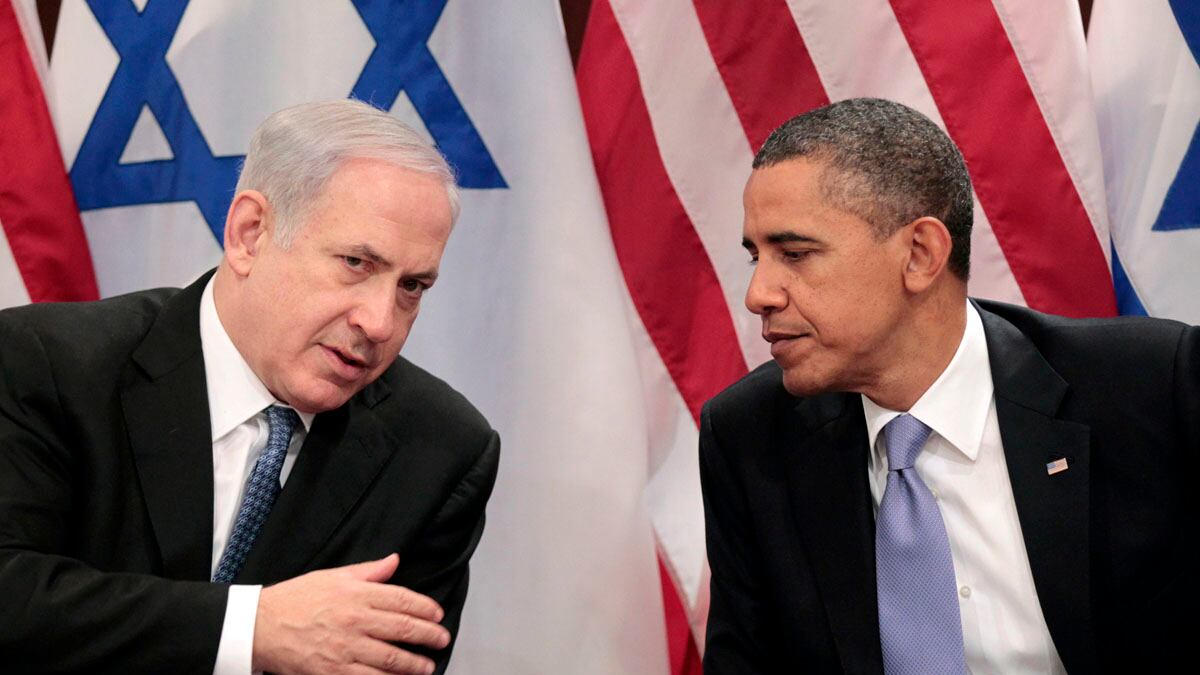Within minutes of the President’s reelection, my twitter feed was alive with conservatives fretting that Obama will take revenge upon Benjamin Netanyahu for doing everything he could to boost Mitt Romney and almost nothing to boost Israeli-Palestinian peace. Unfortunately, they’re probably wrong.
The argument that in a second term Obama will intervene aggressively in the peace process rests on the mistaken belief that because he himself doesn’t have to run for reelection, he’s freed from worrying about the domestic political costs of friction with Israel. That’s untrue.

Even if Obama is no longer worried about reelection, virtually every Democrat in Congress still is, and it’s Congress where groups like AIPAC have long focused the bulk of their energy and wielded the bulk of their influence. If Obama launches a diplomatic initiative that leads him into conflict with Netanyahu, it will be the Democrats in Congress, especially the ones who run the Democratic Congressional and Senatorial Campaign Committees, and thus spend their time raising money for the 2014 midterms, who will make their displeasure felt. And given how much of Obama’s second term fate depends on Democrats controlling the Senate (and not falling further behind in the House), he won’t easily be able to ignore them. What’s more, if Joseph Biden and/or Hillary Clinton have any desire to make their own runs in 2016, they’ll be nervous about an American-Israeli clash, and the President will not want to undermine their chances.
And while the chances of a politically costly confrontation are high if Obama makes a renewed push for peace, the chances of success are low. Netanyahu, a heavy favorite to win reelection, vocally opposes the only parameters—the 1967 lines plus swaps—that could conceivably lead to a peace deal. Mahmoud Abbas publicly favors them, but in the four years since he negotiated seriously with Ehud Olmert, he’s grown weaker and less legitimate in the eyes of his people. That means his room to make wrenching concessions (especially on refugees), and get Palestinians to accept them over the likely opposition of Hamas, has shrunk.
What’s more, Obama’s Middle East agenda is crowded with other issues. In Bill Clinton’s second term, when the region was more placid, he had the time to invest heavily in Israeli-Palestinian (and Israeli-Syrian) peace. But Obama must grapple with the Iranian nuclear issue, the bloodbath in Syria and all manner of potential crises in unpredictable ex-client states like Egypt. All this will suck up the time that an intensive peace push would require.
Finally, anyone who has spent any time around Democratic foreign policy types in recent years knows that many of them are desperate to “pivot” to Asia. Democrats feel that, for the most part, they’ve spent Obama’s first term cleaning up George W. Bush’s mess in the greater Middle East. While they know America must remain engaged there, they see the region largely as a place where America exerts enormous energy trying to keep bad things from getting worse. In Asia, by contrast, a Democratic secretary of state can imagine himself (or herself) the new Dean Acheson, “present at the creation.” Since the greater Middle East has so dominated US foreign policy in the post-9/11 decade, no president has laid out the kind of strategic vision for America’s relationship with China, India, Japan, South Korea, Australia etc that Acheson, George Kennan and Harry Truman famously did vis a vis Europe in the late 1940s. It’s likely that Asia will receive more foreign policy attention in a second term because it is in Asia that Obama and his top aides believe they can etch their names in the history books, a consideration that always looms larger in a president’s second term.
All this could be wrong. I hope it is. But it’s worth noting that while Obama mentioned the peace process often during the 2008 campaign, he barely ever mentioned it this year. He didn’t bring it up in his convention speech, the debates or his acceptance speech. The 2008 Democratic platform promised a “personal” presidential “commitment” to Israeli-Palestinian peace. In 2012, that was taken out.
The Jewish left and the Jewish right both have an interest in promoting the idea that Obama will intervene aggressively on the Palestinian issue in his second term. For the left, the prospect breeds hope, which fuels Jewish groups fighting for a two state solution. For the right, it breeds fear, which fuels Jewish groups skeptical of a two state solution. But in a second term, I suspect, both hopeful doves and fearful hawks will encounter presidential indifference, and the looming realization that on the Israel-Palestinian issue, we are entering the post-American age.






